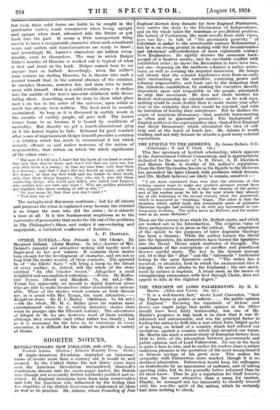THE EPISTLE TO THE HEBREWS. By James Moffatt, D.D. (Edinburgh
: T. and. T. Clark. 12s.) This fine specimen of Scottish scholarship, which appears in the International Critical Commentary, and is appropriately dedicated to the memory of A. B. Bruce, A. B. Davidson and Marcus Dods, is worthy of the author's reputation. From the fnatthe treatise known as the Epistle to the Hebrews has presented the latex Chuir..h with problems which remain, and (Dr. Moffatt believes) are likely to remain, unsolved I am more convinced than ever that the criticism of this writing cannot hope to make any positive advance except from two negative conclusions. One is that the identity of the author and of his readers must be left in the mist where they already lay at the beginning of the second century when the guesswork, which is honoured as 'traditions' began. The other is that the situation which called forth this remarkable piece of primitive Christian thought had nothing to do with any movement in con- temporary Judaism. The writer knew no Hebrew, and his readers were in no sense Hebrews."
These are the axioms from which Dr. Moffatt starts, and which are worked out in his Introduction. The religious value of these prolegomena is as great as the critical. The adaptation of the epistle to the purposes of later dogmatic theology has been a disaster. While the author turned the literal into the figurative, his interpreters have turned the figurative into the literal. Hence much confusion of thought. The examination of the conceptions of sacrifice and priesthood deserve careful study. The key to the famous passage xiii. 10 is that the " altar " and the " tabernacle " mentioned belong to the same figurative order. "The writer has a mystical, or idealistie, bent to which the sacramental idea is foreign. He never alludes to the Eucharist ; the one sacra- ment he notices is -baptism. A ritual meal, as the means of strengthening communion with God through Christ, does not appeal to him in the slightest degree."


































 Previous page
Previous page